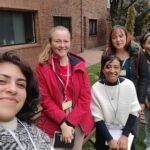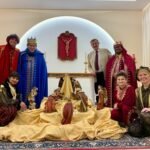
Gospel according to Saint Mark 4,26-34:
Jesus said to the crowds: “This is how it is with the kingdom of God; it is as if a man were to scatter seed on the land and would sleep and rise night and day and through it all the seed would sprout and grow, he knows not how. Of its own accord the land yields fruit, first the blade, then the ear, then the full grain in the ear. And when the grain is ripe, he wields the sickle at once, for the harvest has come.”
He said, “To what shall we compare the kingdom of God, or what parable can we use for it? It is like a mustard seed that, when it is sown in the ground, is the smallest of all the seeds on the earth. But once it is sown, it springs up and becomes the largest of plants and puts forth large branches, so that the birds of the sky can dwell in its shade.” With many such parables he spoke the word to them as they were able to understand it. Without parables he did not speak to them, but to his own disciples he explained everything in private.
Seeds
Luis CASASUS President of the Idente Missionaries
Rome, June 16, 2024 | XI Sunday in Ordinary Time
Ez 17: 22-24; 2Cor 5: 6-10; Mk 4: 26-34
A garden is a great teacher. It teaches patience and careful watchfulness; it teaches industriousness and thrift; above all, it teaches entire trust. So wrote the famous English landscape gardener and writer Gertrude Jekyll (1843-1932).
She was surely right; the greatest benefit of the aforementioned is full trust. That explains why Christ, in speaking of the kingdom of heaven, confirms what the prophet Ezekiel said in the First Reading: It will shoot forth branches, bear fruit and become a magnificent cedar. All kinds of birds will nest in it and rest in the shelter of its branches. It is worthwhile to trust in the laws of nature and in those that govern the kingdom of heaven, in that mysterious and sometimes invisible action of the Spirit in us.
Birds of all kinds are surprisingly intelligent in their choice of a protected and safe nesting place. Today Christ uses the image of the nest to make us understand that every human being has the opportunity to find in the kingdom of heaven the peace and security he seeks. In the Old Testament, this is the meaning of the shadow, which protects us from the scorching rays of the sun. He who dwells in the shelter of the Most High will dwell in the shadow of the Almighty (Psalm 91).
Trust is a precondition, a state we have to reach for a true and complete relationship with another person to be possible. To put it a bit ironically, when a company, especially a bank, wants to take advantage of our money, it calls itself “Your Trusted Bank”.
Indeed, trust is an important essential anthropological attitude. It begins with the child’s longing gaze towards a person who will give him a gentle look and a kind smile. If this basic early childhood experience is successful, developing trust in others and in God usually becomes easier. According to psychologist Erik Erikson (1902-1994), the unfolding of what he called “basic trust” is the first stage of psychosocial development that occurs, or fails, during the first two years of life. Success gives rise to feelings of emotional security, confidence, and optimism, while failure can lead to an orientation of insecurity and distrust.
What, then, is confidence in a person? A feeling of assurance that that person is and will be sincere, capable of doing what they say they can do and can be counted on to deliver on their commitment. Its opposite, distrust, is always driven by anxiety and concern about the other’s honesty, ability and trustworthiness. It is a dimension of belief, which goes beyond strict reason and disposes us to a faith in God.
The Parable of the Mustard Seed, as well as the first one, where Jesus tells us that the grain sprouts and grows, without the sower knowing how, encourage us to walk in trust.
—ooOoo—
The apostle must bear in mind that his testimony must generate in those who see him a solid trust in God, for only with His power, surrendered to His kingdom, are we capable of overcoming our mediocrity. Surely, this is a more powerful argument than many of our speeches. At the closing of the Second Vatican Council, Pope Paul VI exhorted the Church to have “confidence in man”. The Council was aware of man’s ambivalence in history and considered in detail his double face (cf. Gaudium et Spes), that is, the “misery and greatness of man“. For the Council it was important to underline the anthropological line that sees man as a communitarian being and always capable of being transformed by grace.
In Christianity and earlier in Judaism, the basic trust of children is a metaphor for man’s relationship with God. Indeed, Christ reminds us: I tell you the truth, unless you change your ways and become like children again, you will not enter the kingdom of heaven (Mt 18: 3).
Trust in God and trust in man are possible, despite the impression of God’s silence in the face of the mystery of evil, the suffering of the innocent, and despite the ambivalence of human nature. This is demonstrated, for example, by the experience of St. Teresa of Jesus (1515-1582), who was anguished, afraid for her salvation, partly because of the sermons of the time on the pains of hell that sought to arouse this fear in ordinary people in order to discipline them morally. After an experience of grace in 1554, upon contemplating a small figure of the scourged Jesus, Teresa felt liberated from that fear, sensing that Jesus did not come into the world simply for us, in general, but personally for her. She felt and was called to a true friendship with God. From then on, she was able to put “all her trust in God“.
The first of the parables also represents a call to trust in God’s plans. The first disciples were eager to see a victory of the Messiah. Just as they imagined it: immediate victory over the invading enemies and freedom for their people. But it was not so.
Similarly, in the First Reading we hear Ezekiel at a dramatic moment in Israel’s history. Jehoiachin, the last scion of David’s dynasty, was defeated, captured and deported to Babylon.
Did God fail in the loyalty he swore to his chosen one?
To this distressing question, Ezekiel, who is among the exiles in Babylon, answers with an image: David’s family is a magnificent cedar that a barbaric and ruthless woodcutter, Nebuchadnezzar, king of Babylon, cut down and tore to pieces.
But God does not lie, he never denies his promises. This is what he will do. He will go to Babylon, from the destroyed cedar of David’s dynasty, take the last shoot and replant it on a high mountain in the land of Israel. This fragile sapling will grow into a huge cedar and birds of all kinds will find shelter and nest in it. Ezekiel probably dreamed of a quick restoration of the Davidic monarchy, but years will pass and his expectations will be frustrated.
We can learn valuable lessons from these stories and these Readings. The fruit of the apostolic act cannot be “programmed” by us, even if we make an effort similar to that of the farmer, who, although he has to do many tasks, knows that the earth bears fruit by itself. In truth, Providence overcomes our resistance to good and secretly works in the souls of people so that, sooner or later, the necessary conversion can take place. We cannot “accelerate” the fruit that grace will produce in a soul, but our humble and permanent testimony truly serves to help it to arrive at the opportune moment.
This parable serves as a consolation to those of us who become discouraged, using our experience and our worldly logic, when we feel that our efforts are useless… or when we believe that the kingdom of heaven arrives thanks to our cunning and good will.
The kingdom of heaven, even if we think about it a lot, remains a mystery. For this reason, there is no lack of beautiful surprises, of how – without our knowing why – we see the fruits in the midst of difficulties and the most intense pain. This was the story of the father of a little girl:
A few years ago my mother passed away. At an intimate gathering of family and friends, I offered a heartfelt prayer. My daughter Laura, who was only three and a half years old, wanted me to hold her in my arms. Instinctively, I did. Feeling my body tremble with emotion, Laura looked at my face and saw, for the first time in her life, tears running down my cheeks. Her face seemed to tell me: how can you cry, if you are a daddy? Then she put her little arms around my neck and hugged me tightly. He didn’t let go until I stopped shaking with emotion. Then he gently released my arms from around my neck, looked at my face to confirm that there were no more tears, and continued to hug me to make sure I was okay.
Laura taught me a lot about how to comfort and love others in that moment. Sometimes we don’t know what to do or how to help others in their time of need, when the appropriate response is our love. The little arms and heart of a little girl were able to comfort the broken heart of a grown man.
—ooOoo—
We will all have to appear before the judgment seat of Christ, to receive the reward or punishment for what we have done in this life. Surely we have missed many opportunities, as happened to the rich man in that famous parable, who did not want to help the poor Lazarus, preferring to follow his own project “to do good”, to organize generous parties and banquets for his friends. Eternal life is not born out of nothing; in the Second Reading St. Paul teaches us that, although God rejects no one, our capacity to accept his love depends and will eternally depend on how we have sown in this life.
The parable of the mustard seed does not refer only to the history of the Church. It also warns us of the importance of small gestures of mercy, attentions and service to our neighbor, which become part of the kingdom of heaven. Christ is so interested in making us understand this truth that he exaggerates the reality of the mustard seed, for it causes a plant to sprout that never becomes a majestic tree like a cedar.
The Gospel text ends today with a relevant observation: Christ explained the parables to his disciples in private. Will we be humble enough to meditate before Him on what they mean, on what He is transmitting to us at each moment? Silent prayer is what occupied most of the time in Jesus’ life, especially at night. May this gaze at our heavenly Father occupy the center of our Spirit of the Gospel.
_______________________________
In the Sacred Hearts of Jesus, Mary and Joseph,
Luis CASASUS
President











